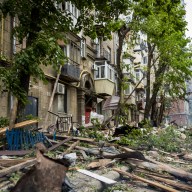JAIPUR, India – A series of bombs exploded across this ancient city, killing at least 80 people and transforming busy markets, a jewelry bazaar and a Hindu temple into scenes of carnage, police said Wednesday.
A. K. Jain, additional director-general of state police, said that 20 people succumbed to their injuries overnight, raising the death toll in Tuesday’s blasts to 80.
Nearly 200 people were injured in seven blasts within the old walls of the western city known for its pink-hued palaces, Jain said. Police said an eighth bomb was found and defused.
Suspicion quickly fell on Islamic militant groups blamed for a string of attacks in India in recent years.
“Obviously, it’s a terrorist” attack, said A. S. Gill, the police chief of Rajasthan, the state where Jaipur is located. “The way it has been done, the attempt was to cause the maximum damage to human life.”
The explosions began around 7:30 p.m. Tuesday. One went off at a market near a temple dedicated to the Hindu monkey god Hanuman. Tuesday is the day of worship set aside for Hanuman, and the temple was crowded with people offering prayers on the way home from work.
Another bomb detonated near the Johari Bazaar, the city’s jewelry market that is a popular destination for tourists. The tourist season ended in March, however, and there were no immediate indication that foreigners had been caught in any of the explosions.
Parikshit Bhandari, who saw the attack near the jewelry market, said there was “blood all around and wounded people crawling on the ground.”
Bombing sites were littered with dropped shopping bags, mangled bicycles, damaged cars and overturned bicycle rickshaws, the most popular mode of transport in the crowded lanes of Jaipur.
No one claimed responsibility for the attack, as is the case with most bombings in India. But within hours of the blasts, authorities were suggesting that blame would eventually fall on Pakistan and the Islamic militant groups that India accuses its neighbour of backing.
“One can’t rule out the involvement of a foreign power,” said India’s junior home minister, Sriprakash Jaiswal, using language commonly understood to refer to Pakistan.
Jaiswal refused to say if he was talking about Pakistan. But he suggested the bombings were connected to previous attacks on India, saying that “the blasts are part of a big conspiracy.”
Indian authorities have blamed Pakistan-based Islamic extremist groups for a spate of bombings that have killed nearly 400 people in this predominantly Hindu country of 1.1 billion people since 2005. Pakistan, an overwhelmingly Muslim country, denies any role in the bombings.
The attacks have run the gamut from July 2006 train bombings that killed nearly 200 people in Mumbai, India’s financial centre, to small blasts like the one that struck a Muslim shrine in Rajasthan last year, killing two people.
Each new bombing has brought fears of a fresh outbreak of the violence between Hindus and Muslims that has sporadically bled India throughout its history, and authorities appealed for calm after Tuesday’s attack.
Authorities quickly ordered alerts in New Delhi, Mumbai and several other cities. Security was also stepped up at airports and railway stations across the country.
Foreign Affairs minister Maxime Bernier condemned the bombings, calling them “a deplorable act of violence against innocent civilians.”
Bernier said in a news release that Canada is working with the Indian authorities to determine whether any Canadians have been directly affected by the events.
In Washington, the U.S. government also condemned the attack.
Jaipur is one of the major attractions in Rajasthan, a desert region dotted with palaces and temples that draw hundreds of thousands of Indians and foreigners every year, from bargain-hunting backpackers to celebrities like Mick Jagger.
















